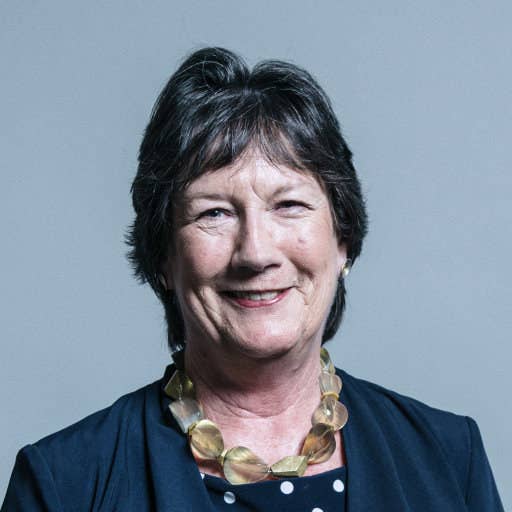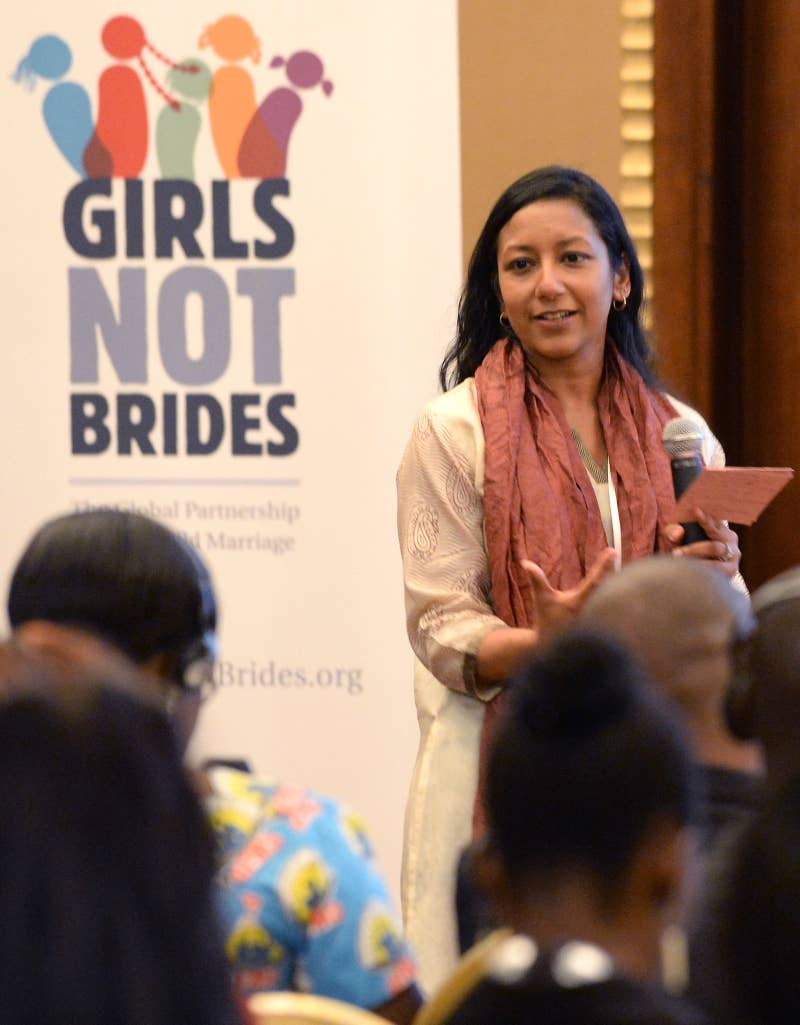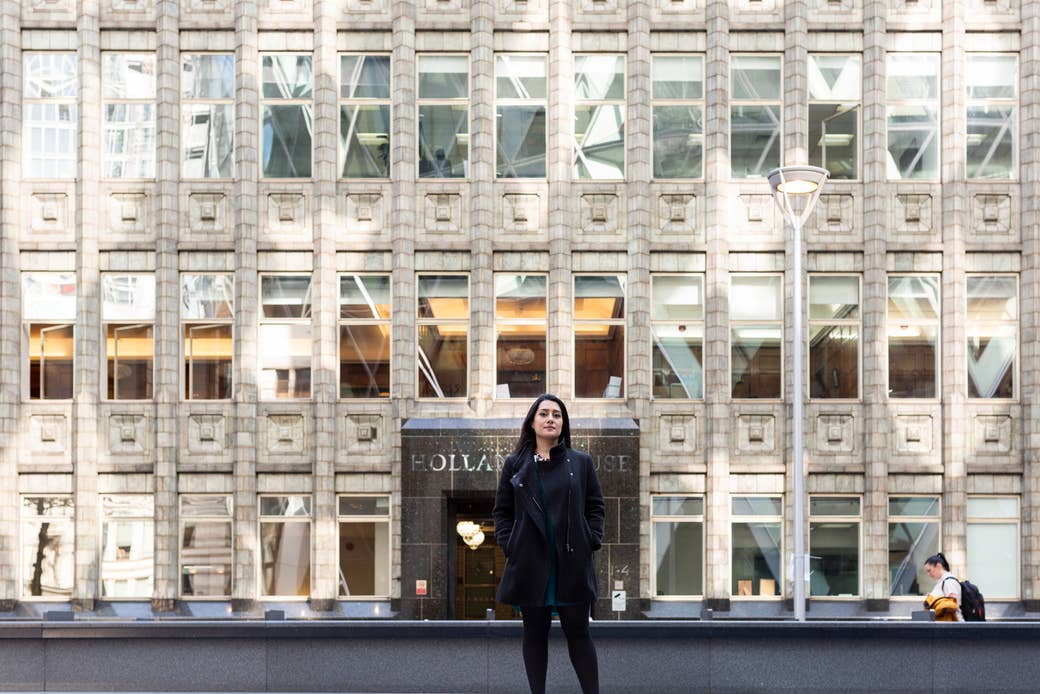LONDON — Government ministers are refusing to back a bill that aims to tackle forced marriage by increasing the UK’s legal marriage age to 18, saying they “had not seen any evidence” that it would help — despite campaign groups and forced marriage survivors telling them otherwise.
In August, home secretary Sajid Javid promised to do more to tackle forced marriage in Britain, describing it as a “despicable, inhumane, uncivilised practice”. Yet the government has so far failed to adopt a private members bill aimed at helping to put an end to this very problem.
The bill, which has its second reading later this month, has been put forward by Conservative backbench MP Pauline Latham, but has cross-party support. Labour MP Sarah Champion is among those backing a change in legislation, and has criticised ministers for failing to adopt the bill, saying to do so is “allowing forced marriage to flourish”.
Latham said she thinks the government has failed to change the law because forced marriage “isn’t seen as a problem”, but that she “was working with ministers to try to get that changed”.
But a Home Office spokesperson told BuzzFeed News that “the government has not seen evidence of any connection between forced marriage and the marriages of people of 16 and 17 years” — and the bill has little chance of succeeding without government backing.
Under current laws, the minimum marriage age is 18 years old in England, Wales, and Northern Ireland, but there is provision for marriage with parental consent between the ages of 16 and 18. In Scotland, the minimum age of marriage is 16, and no parental consent is required.
Some parents use these legal loopholes to force the marriages of their children who are aged 16 or 17, campaigners told BuzzFeed News.
The Home Office estimates that between 5,000 and 8,000 people are at risk of being forced into marriage every year in the UK. In 2016, the UK Forced Marriage Unit’s helpline dealt with 1,428 cases of forced marriage; 15% of these involved children aged 16 and under, and a total of 30% were under-18s.
“It’s a problem that’s really under the radar; generally when you think about child marriage or forced marriage you think about it happening in South Asia, sub-Saharan Africa,” Lakshmi Sundaram, executive director of Girls Not Brides told BuzzFeed News, but “child marriage is happening here in the UK, in Europe, in the US.”
“What is striking about these numbers is the large percentage of those forced into marriage, or think they might be forced into marriage, are children,” Sundaram said.
“[The National Society for the Prevention of Cruelty to Children] reported in 2017 a large rise in requests in counselling for forced marriage from children as young as 13 years old,” she added.
“I think there’s been a romanticised view of child marriage in a context like the UK that it’s the 17-year-old who wants to get married to her 18-year-old sweetheart, them wanting to start the next phase of their life. The emerging data shows quite a different picture.”

Shaheen Hashmat was just 12 years old when she escaped from her family home in Scotland. She had gradually started to pack up her things and sneak them out of the house, into the boot of a waiting car.
Her older sisters had already been forced to marry men they did not know, and Hashmat feared that the same fate awaited her. In her mind, leaving the family home before she turned 16 was her only way out.
Her sisters, then aged 16 and 17, were taken to Pakistan on what they thought was a family holiday. Only once they arrived in the country were they told what was happening. “They were shown pictures of the men that they would be made to marry,” Hashmat said. “I’m engaged,” one of her sisters wrote in a letter to her siblings at home, “and by the time you read this letter I’ll be married.”
Her parents were very strict, and she was not often allowed to leave the house, but on the day she escaped, she managed to convince her parents that she needed her sister’s help with a geography project, and they let her go.
“For the first time in however long, I was allowed out,” Hashmat told BuzzFeed News. “That was the night that we never went back.”
The police became involved after one of Hashmat’s relatives told a doctor about their family situation.
“We saw the police, there were solicitors, social services, there was the children’s panel at that time, psychologists. Everyone, just everyone, which was really good, because it was cross-sectoral support, and intervention, and eventually with the police they put out an interdict [a civil court order that can prevent a person from contacting someone else.]”
Police officers visited her parents to tell them that their daughter would not be returning.
The message they delivered, Hashmat said, was: “Your daughters have gone, this is what’s happened, there’s an interdict against you, you’re not allowed to contact them.”
“And,” she added, “that was that.”
For Hashmat, although she escaped being sent abroad to marry, the impact of her experience has been lifelong. Going from having her every move controlled to complete freedom after leaving home at such a young age had a huge psychological impact. At just 13 years old, she attempted to kill herself.
“I’d just turned 13 and I was definitely sure that I didn’t ever want to go back,” she told BuzzFeed News. “I knew that for certain.” But, she said: “That kind of abusive environment where absolutely everything is under control, you don’t have a choice in anything, there’s no such thing as personal boundaries or anything like that.
“To go from that to all of a sudden choosing everything was really hard, and obviously I’d had this big family structure, and it was just such a shock. Basically I ended up in hospital because I tried to kill myself, I took an overdose.
“The impact can last for years,” she added. “By the time I was 19, 20, I had started self-medicating with a load of alcohol, and because of that lack of boundaries I got myself into some really difficult situations. When you’re not taught how to manage relationships or friendships with guys you don’t understand how dating works and how to take care of yourself, how to protect yourself.
“So basically I was assaulted a few times, more than assaulted a few times, in my late teens and early twenties, and that was really tough. Just years spent trying to get over the mental health impact, depression, anxiety. And now, now I’m 35 and I honestly can say I’m starting to come out the tail end of it now, so it does take a long time. I’m still in therapy, but definitely I’m a different person to where I was even two or three years ago.”

In Hashmat’s view, as a young teenager she would not have been able to escape without that external support, but, she said, if the marriage age were raised then girls growing up in similar home environments to hers would have a valuable extra two years to find a way out.
“You’ve had more of an education, you have more of a network, and there’s more opportunities, especially through school, to find your own direction a little bit more than you would have when you’re 16. Education’s really important, and you are mature, more able to make your life choices.”
Changing the law, she said, would also prevent parents from taking 16- and 17-year-old children out of the country to marry, as her parents did with her sisters.
“There are people who’ve said if you want to make a choice you should be able to make it,” she added. However: “It’s only going to delay the situation by a couple of years — if you really want to do it, you’re going to do it, and if you want to get married, you’ve got a whole lifetime together.”
“And,” she said. “I think that’s really a small price to pay for protection of that really, really vulnerable group of adolescent girls.”
She added: “[The government] absolutely should be backing this bill, it’s the right thing to do, it’s a message we’ve been putting out to other governments and other countries for a long time.
“On an international level, we know that children getting married is not good for them, and affects so many other areas of their lives, that it just doesn’t make sense. There’s so much evidence to support that now, that to not back it would just not be logical, so they absolutely have to back it.”
Jasvinder Sanghera is another survivor of forced marriage who founded charity Karma Nirvana. At the age of 14 she was shown a picture of the man she was to marry. “When I came home from school, [my parents] presented me with a photograph of the man I was promised to at the age of 8,” she told BuzzFeed News. “He was shorter than me, older than me. I just wanted to go to school — it was not an option.”
She refused to follow her parents’ wishes, and ran away from her family home in Derby at the age of just 16. “My family made the decision to disown me because it was so shameful,” she told BuzzFeed News. “My younger sister was forced to marry the man I was promised to.”
Her siblings did not escape, and were forced to marry men they did not know. “All of them were overseas,” she said. “Every single one of them arrived here through a forced marriage; they were granted a visa.”
Sanghera lost one sister who killed herself; she had been married at the age of 15. “She suffered a horrific marriage,” she said. “She would have been a different person at the age of 18, her ability to stand up to my parents, she could have stayed in education. Her life could have been very different.”
Because of the pressure from their wider family network, Sanghera said, young women often feel there is “really nowhere to turn.” Allowing them to stay in school, study for A-levels, and develop a bit more maturity could, Sanghera said, make a whole world of difference, and would have helped her and her sisters.
“It would have made a difference,” she said. “I believe it would have given us more years to be able to stay in school. I certainly believe that children don’t even know their rights around marriage.
“It might make the parents think differently as well,” she added.
It is because of young women in the UK like Sanghera and Hashmat that members of parliament want the government to look again at age-of-marriage laws.
Latham, the MP for Mid Derbyshire, said that those negatively affected would be the small numbers of under-18s who want to marry for love, and, she said, asking teenagers who want to wed to wait two years is not unreasonable.

“A lot of people have this rosy view that it’s actually teenagers at school together who’ve fallen in love. There are some like that, but there’s no reason why they can’t wait two years — and that isn’t normally the case.”
She added: “We know that there are a lot of girls disappearing during the summer to go and be married, not necessarily through their own choice,” she added. “It doesn’t mean they’re getting married to someone of their own age; they’re often much older. It’s a form of child abuse, really.”
However, Latham said that it was not just for young women in this country that the laws needed to be changed, but also to give Britain more authority on the world stage, when lobbying developing countries to change their own laws.
“I would like to see this anomaly taken out of our law. Then we can genuinely talk to developing countries and say, ‘We’ve changed our marriage age, so you should change yours,’” she said. “We’re asking developing countries around the world to raise the age of marriage to 18, and they’re saying, ‘But you let children get married a 16.’ We’re spending millions of pounds trying to change their attitudes, so why are we not doing the same?”
Champion told BuzzFeed News that she was “constantly embarrassed at the hypocrisy” of the UK asking other countries to enforce stricter laws than Britain has in place.
“If we are serious about preventing child abuse, we have to tackle all legislation that allows it to continue,” she said. “Letting children marry at 16 is a throwback that is being manipulated to allow forced marriage to flourish.”
She added: “My campaigning to prevent child abuse frequently takes me abroad. I am constantly embarrassed at the hypocrisy of telling other nations how to protect children when they look at us in horror for marrying off children at 16. The Bill closes a legal loophole that enables forced marriage in the UK. Sajid Javid needs to use this opportunity to show he’s serious about preventing child exploitation.”
Sundaram, who works internationally with girls at risk of forced marriage, said her experience had been similar. “One thing that is becoming a big point is that some people have said that there’s no need to have age-of-marriage laws in countries that have strong child protection,” she told BuzzFeed News, “but what we’re starting to see is countries like Bangladesh, Tanzania are pointing to Europe, North America and saying, ‘You don’t have a minimum age of 18 in your countries, so why are you telling us to do this?’
“So with the UK government being a real champion in supporting the rights of girls around the world, it’s really important that it’s looking at these issues internally and not being hypocritical.”

She pointed to the example of Norway, which recently strengthened its age-of-marriage laws. The country “wanted to speak up more forcefully about these issues, so they needed to be tackling it at home”, she said.
All of the women that BuzzFeed News spoke to said that changing the law would not in itself put an end to forced marriage — but that it would be an important step in the right direction. Having a legislative and policy framework in place would be, in Sanghera’s words, “another measure to tackle an area of abuse that is on the increase and impacting on children and young people”.
“You are a different person … at 18 than you are at 16,” she told BuzzFeed News. “Because of the relationship you have with your parents, you feel obliged. We hear about cases of 5-year-olds being engaged, promised to people. This is happening in Britain.
“In terms of leadership, this would be another opportunity to tackle forced marriage — if the government is serious about all children and young people having the right to choose who they want to marry and continue in education.”
A government spokesperson said: “The UK is a world-leader in the fight to stamp out the brutal practice of forced marriage, with our joint Home Office and Foreign and Commonwealth Office Forced Marriage Unit (FMU) leading efforts to combat it both at home and abroad.
“The government has not seen evidence of any connection between forced marriage and the marriages of people of 16 and 17 years in England and Wales with the appropriate consents. We will keep this under review.”
